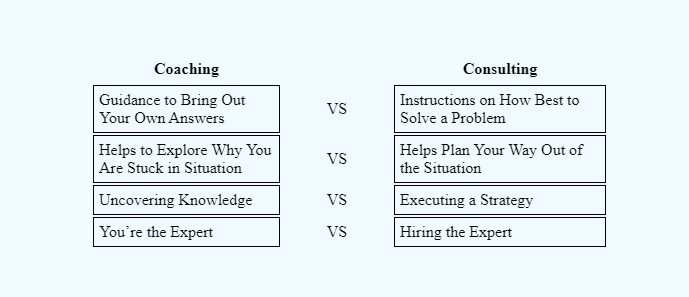Consulting and coaching are often used interchangeably. However, the results and knowledge you walk away with will differ greatly. Understanding where the terms differ is imperative to recognize which will best serve you and your business. If you approach a professional expecting one outcome and they do not deliver, it may be more of a misunderstanding than a failure to fulfill on their part. We are writing this blog to lay out the terms distinctions simply and clearly, as to avoid the scrutiny of the professional’s work and your dissatisfaction as a client.
Let us first preface the following information with a disclaimer: “Both professions are as diverse as each of the individuals who are doing the coaching and the consulting”
Coaching vs. Consulting: Where do they differentiate?
1. Guidance vs the “How to” manual
For the sake of explanation, let’s say you need to write a contract for your employees to fill out. A coach would ask you questions about what needs to be addressed in the contract. For example, the professional will ask “do you want your employees to have the option to work for a competitor at the same time?” If the answer is no, then you would add a non-compete statement to the contract. Whereas, a consultant would give you a template that covers all of your bases. Hire a coach when you want to walk the path yourself but need help discovering the best direction. Contrarily, hire a consultant when you want the professional to walk the path for you and give you a detailed map of the direct route.
2. Uncovered Knowledge vs. Execution
You, as the client, are an expert in your business. A good coach is naturally curious and they ask lots of questions with the goal of helping you solve your own problem. The hiree is the expert. An intelligent consultant will also ask you questions, but more informational based to gather metrics for determining the best solution for you. Both of these have their place depending on your main goal for your business.
3. Raw Data vs Soft Data
A consultant often seeks “hard data” and using those metrics they present specific recommendations. A coach may give you an assessment seeking “soft data”, but this is less focused on numbers or measurable factors and more on the reasons behind them. Sometimes all you need as a client is hard data (numbers like ROI, income, expenditures, analytics) to determine the next steps and that is when a consultant is indispensable. On the other hand, a coach can help you determine what you really want and to realize a vision for the future of your business.
Hopefully, you now have a better perspective on the two terms mentioned above. In summary, hiring a coach will help you utilize your own expertise, explore your vision, and create solutions yourself under their guidance. In contrast, a consultant will use their expertise to give you recommendations and the linear steps to reach a specific goal. Both of these methods have their place, may provide varying levels of training, and can help your business prosper. In reality, most coaches provide a moderate amount of consulting and some consultants do a skosh amount of coaching.
Be clear about your expectations with the person you are looking to hire and establish a mutual understanding about what you wish to walk away with.

If you are struggling to find a direction for your business and need guidance on where to start, email Christy at Small Business Accounting to set up coaching sessions now. Christy@lookatmybooks.com

